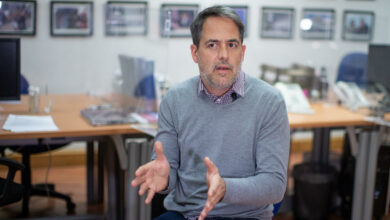Cuba facing “systemic crisis,” leading intellectual says

By Juan Palop
Havana, Apr 7 (EFE).- In Cuba, one can be on the left and criticize the Communist government. One can denounce Washington’s 60-year-old embargo on the island without accepting it as a justification for repression. And one can advocate for better ties with the United States while stressing that the more urgent need is for dialogue between Cuban authorities and the citizenry.
That was the position expressed by one of Cuba’s foremost intellectuals, Alina Barbara Lopez Hernandez, in a recent interview with EFE.
The conversation took place before the historian, philosopher, and essayist was briefly detained Thursday after protesting the likewise short-lived arrest of journalist Jorge Fernandez Era.
“Cuba is in the final moment of a political, social, and economic model that I don’t think is reformable under these conditions,” Lopez said, excluding the possibility that the government in Havana can pursue an economic opening like those of China or Vietnam.
“Until maybe a few decades ago it could have resisted change with an economic reform alone. That’s not possible at this moment, because there is a general crisis, a systemic crisis, that includes not only the economic dimension, but also the political, social, and symbolic ones,” she said.
Among the factors militating against a China-style solution, she cites “massive access” to the internet thanks to the launch of mobile data in 2018 and the spread of extreme poverty on the island.
“The government can’t reverse the economic situation and the people who for a long time didn’t even have political concerns have them today,” Lopez said. “Because there’s nothing that makes a person more political than poverty and a situation of instability and insecurity about the future.”
As a historian, she is optimistic about Cuba’s future, but she sees no chance of change in the short term without action by the citizens.
Though she defines herself as a socialist, Lopez said that socialism “should be a conscious and chosen option,” not something imposed by a single-party state.
Lopez said she is in favor of “any dialogue” between Cuba and the US, but added that Washington must abandon the notion of putting pressure on the government in Havana.
“I regard as positive any type of conversation that brings an improvement in relations and the end of the blockade,” she said, referring to the economic embargo the US enacted in 1962.
In her view, however, US-Cuba talks should take a backseat to intra-Cuban dialogue.
“We citizens of Cuba as seen as children both by the government of Cuba and that of the US, which doesn’t understand that it’s not a question of the Cuban government’s agreeing with them, but that it needs to talk with us, with the citizens,” Lopez said.
It will require “pressure from below” to get Cuba’s government to engage in genuine dialogue with the people, she said, adding that the alternative to talks is “an armed uprising.”
On March 18, Lopez went to Freedom Park in the western city of Matanzas, her hometown, to speak out for the release of political prisoners and more benefits targeting Cuba’s neediest people, among other demands.
She live-streamed the demonstration on social media.
“I will do it every month on the 18th. There are already people who tell me that they will also go out to the parks in their cities. I don’t convene anybody, but neither will I reject anybody who comes there and wants to sit with me. I’m not going to shout any slogans, I’m not going to hold up any placards,” Lopez told EFE.
EFE jpm/dr





